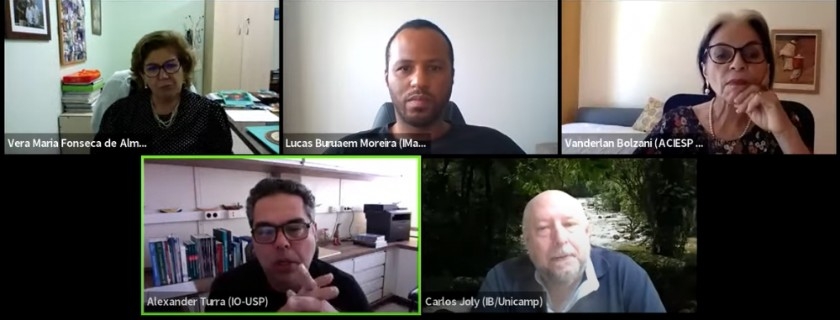


In a webinar held to present the third chapter of the book published by the São Paulo State Academy of Sciences to commemorate FAPESP’s sixtieth anniversary, specialists showed that protection of terrestrial and marine environments contributes to food production and job creation, among other benefits (photo: Agência FAPESP).
Published on 08/15/2022
André Julião | Agência FAPESP – Biodiversity conservation should be a concern for society as it is closely linked to the eradication of poverty and hunger, the health and wellbeing of all, the reduction of inequality, responsible consumption and production, and other Sustainable Development Goals (SDGs) set by the cto be achieved by 2030.
The urgency of biodiversity conservation was one of the issues highlighted by Brazilian researchers in a webinar on “Terrestrial and marine biodiversity: conservation, use and sustainable development” organized by the São Paulo State Academy of Sciences (ACIESP) and the São Paulo Research Foundation (FAPESP) to present and discuss the third chapter of FAPESP 60 Anos: A ciência no desenvolvimento nacional, a book about the Foundation’s 60 years of contributing to national development by investing in scientific research.
“The biodiversity SDGs [14, Life below water, and 15, Life on land] are strongly associated with poverty reduction. Biodiversity can mean food, which involves SDG 2, Zero hunger, and biodiversity can create jobs,” said Carlos Joly, a professor at the State University of Campinas’s Institute of Biology (IB-UNICAMP) and a member of the steering committee for the FAPESP Research Program on Biodiversity Characterization, Conservation, Restoration and Sustainable Use (BIOTA-FAPESP).
Joly cited a recent study in which Brazilian researchers estimate that Brazil could create 2.5 million jobs by restoring 12 million hectares by 2030, in accordance with the targets set by the Paris Agreement. “They aren’t jobs that require qualification. They’re the kind of job Brazil needs right now,” he said.
Furthermore, he added, biodiversity relates to cities and water generation, which depends on maintaining native vegetation.
For Vanderlan Bolzani, a professor at São Paulo State University’s Araraquara Institute of Chemistry (IQAr-UNESP) and President of ACIESP, science and knowledge contribute to change at times of turbulence.
“We’re living at a very difficult time in human history [...], but in the post-war period Brazil was an agricultural country and now, despite regional differences, it’s a country we’re proud of, even with the backsliding we’re seeing just now,” Bolzani said in her opening remarks.
Biodiversity here exceeds that of any other country and can be one of the reasons for this pride, she said, noting that Brazil is home to 11% of the world’s vascular plants (which account for over 80% of all known plant species), 11.3% of its mammals, 17.2% of its birds, and 23.2% of its freshwater fish. Brazil has many large biomes with vast areas that have not been studied by scientists, so the potential for discovering new species and chemical substances is also enormous.
“If we imagine that biodiversity is the greatest chemical library ever conceived of by any human being, this is because it contains the most unusual molecular models, which cannot be synthesized by any winner of a Nobel Prize in Chemistry,” Bolzani said.
Ocean of ecosystems
For Alexander Turra, a professor at the University of São Paulo's Oceanographic Institute (IO-USP), the oceans are more than the organisms that live in them: they are a great biome with various ecosystems and habitats, and can be an agent of social transformation because of their role and the connections that depend on them.
Fishery oversight is deficient in Brazil, he continued, citing the example of trawling. “We have ways of increasing food production without necessarily causing conflicts. We must think about how the form of this economic activity can combat hunger and poverty, how it can benefit communities more comprehensively. This will contribute to achieving the item on health and welfare in the 2030 Agenda,” he said.
The harm done to biodiversity by pollution of the oceans was the focus for Lucas Buruaem Moreira, a professor at the Federal University of São Paulo’s Marine Institute (IMar-UNIFESP), and biodiversity in the Amazon for Vera Maria Fonseca de Almeida e Val, a researcher at the National Institute for Research on Amazonia (INPA).
The other participants in the webinar were Marie-Anne Van Sluys, a professor at the Institute of Biosciences (IB-USP) and a member of FAPESP’s Adjunct Panel for Special Programs and Research Collaborations; and Adriano Andricopulo, a professor at the São Carlos Institute of Physics (IFSC-USP) and Executive Director of ACIESP.
A recording of the webinar can be watched at: https://youtu.be/XBGta5JpJlw.
The third chapter of FAPESP 60 anos: A ciência no desenvolvimento nacional is available for download at: https://fapesp.br/eventos/2022/aciesp_cap3.pdf.
Source: https://agencia.fapesp.br/39363